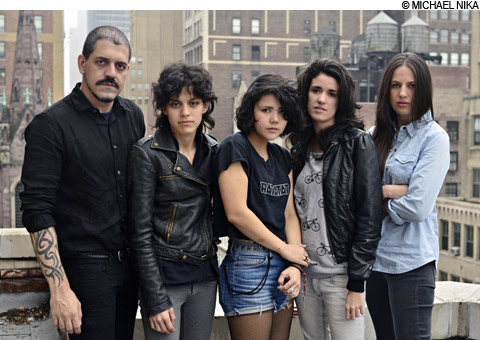
NOT TIRED “I think a band should be about the fun of it,” says CSS’s Lovefoxxx (center), “and we still have this, this fun.” |
Struggling young bands toil to discover something novel, to uncover a musical concept that no one has encountered before, only to find, if they succeed, that this initial toiling is just step one — and that step two involves finding a way to progress so that your novel band doesn't become a novelty. São Paolo's Cansei de ser Sexy (known as CSS) know this two-step process well: ever since blowing up internationally on the Internet hype of their 2006 body-rocking homonymous debut album, with its beguiling mashup of pure pop, electro-thump, and indie guitar swing, they have labored continually to avoid becoming a novelty while discovering who they are and what they want to be.The key, says vocalist Luísa Hanae Matsushita, better known as Lovefoxxx, is the band's naturally upbeat nature. "When we take the stage," Lovefoxxx says, "it is always with a cheerful approach, because we're genuinely happy to be there. For us, for this group of people, it's our preset position to be glad and cheerful." Formed by a loose conglomerate of friends in 2003, within a few years the infectious cheer of their debut spread worldwide, as a new audience of Internet-savvy indie fans discovered the disco bounce of "Let's Make Love and Listen to Death from Above," the playful sneer of "Meeting Paris Hilton," and the naive blissful whump of "Music Is My Hot, Hot Sex." Their carefree 'tude proved to be viral, and CSS quickly became one of the most popular Brazilian bands of all time.
CSS's success lies within their idiosyncratic worship at the altar of pop, and the way they mix love for the shiniest hits of the genre with the messy smear of the underground world from whence they arose. "The thing is that our lives are punctuated by these huge pop singles," Lovefoxxx explains, "and these memories are something that we love about pop music. You go to the store, the diner, and these songs are playing and they form this instant nostalgia of when you heard them."
That honesty shone in the vaguely prickly sophomore outing Donkey (2008, Sub Pop), as the band dropped the pop culture references in favor of tales of insecurity and loneliness, no doubt the result of spending years away from home, living out of suitcases, and seeing a grueling never-ending tour schedule result in a number of lineup changes. "It's a darker album," Lovefoxx reflects. "I think people were expecting more, you know, lyrics about Britney Spears and shit."
If Donkey was a dark response to the rigors of touring and indie fame, this year's La Liberación (Cooperative Music), is the sound of a band rediscovering fun and finding themselves. "With this record," Lovefoxxx explains, "we had a year off of touring, and during that time I was thinking a lot about my teenage years, about being from a small town and wanting to go somewhere else where you can find people who are like you and belong somewhere. La Liberación is very teenage-directed." Tracks like "City Grrl," "La Liberation," and especially album closer "Fuck Everything" find CSS mixing teen longing with pop abandon and rock energy. "You say, 'Baby, we always lose our edge'/But baby, oh baby, is that too bad?" Lovefoxxx croons in the reggae-lilting "Hits Me Like a Rock," a mature perspective for a misfit crew that knows that the only thing worth holding onto is the ability to lose yourself in song.